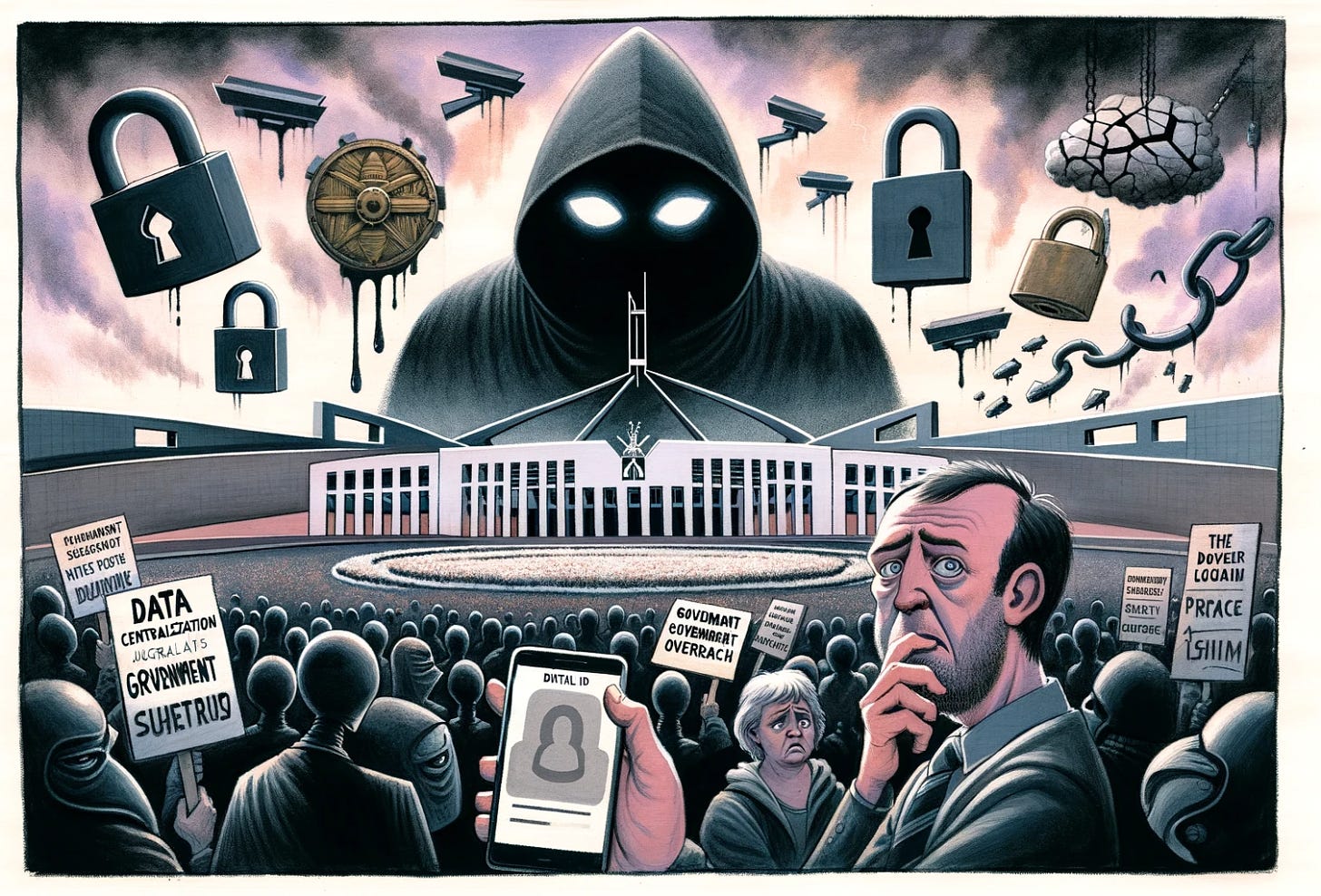How to avoid Digital ID
Nation First looks at practical measures to take to be free of the Australia's Digital ID system.
Dear friend,
Australia’s Albanese Labor Government has had its Digital ID Bill passed by the Parliament in the past week. It will now become law.
The Digital ID system is meant to be a unified digital identity for every Australian.
While its supporters claim it will make accessing services easier, the truth is much more concerning.
The Digital ID Bill passed by the Albanese Labor Government this week will soon become law.
The Digital ID system centralises personal data, making it prone to misuse.
It grants the government unprecedented control over our identities and lives.
Various political parties and civil liberties groups have voiced significant concerns.
Privacy concerns include increased risks of cyber-attacks and privacy breaches.
Surveillance and government overreach are major fears associated with the Digital ID system.
The bill lacks adequate safeguards to protect against personal and biometric data abuses.
There are fears of function creep, where the system could be used for broader surveillance.
Avoid the Digital ID system by refusing to comply and using privacy-focused tools.
Political action and collective resistance are crucial to protect our freedoms and repeal the bill.
Thank you for reading Nation First, by George Christensen. This post is public so feel free to share it.
The Digital ID system centralises our personal data, making it prone to misuse and cyberattacks.
Even more troubling, it grants the government unprecedented control over our identities and, by extension, our lives.
But don’t just take it from me.
The soon-to-be-implemented Digital ID system has sparked significant criticism from various quarters, including the Opposition political parties, minor political parties, pro-freedom groups and activists, and traditionally left-wing civil libertarian groups.
It was also severely criticised in a minority report from a Senate committee inquiry into the Digital ID Bill, with one of the critics—the Greens political party—subsequently (and bizarrely) voting for the bill.
The reasons against.
The serious issues that have been levelled against the Digital ID system include:
Privacy Concerns: The centralisation and digitisation of the personal information of most if not eventually all Australians increases the risk of cyber-attacks and privacy breaches. The Digital ID system could be vulnerable to unauthorised access and misuse, putting Australian’s sensitive information — including biometric data — at risk.
Surveillance and Government Overreach: The Digital ID system could eventually be used by government for surveillance and monitoring. Centralising personal and biometric data in a single system certainly increases the risk of unauthorised surveillance. If one single entity, such as the government, controls this data, it can be tempted to use it for monitoring citizens under the guise of security or public interest.
Human Rights and Civil Liberties: Various civil liberties organizations, including the New South Wales Council for Civil Liberties, and Digital Rights Watch, have raised concerns about the bill's implications for human rights. They argue that the bill does not provide adequate safeguards to protect against personal and biometric data abuses.
Law Enforcement Access: The Digital ID Bill allows law enforcement to access biometric information with a warrant or consent. Critics argue that even with these conditions, the threshold for access is too low and could lead to misuse. The New South Wales Council for Civil Libertiesadvocated for a complete prohibition of law enforcement access to ensure that the system cannot be used for surveillance purposes. The Greens — who, as aforementioned, voted for the Digital ID Bill — also shared these concerns about law enforcement access of Digital ID data.
Function Creep: Many people rightly worry about function creep, where Digital ID could be used for purposes beyond its original intent. While some dismiss this “slippery slope” argument, there is no denying that function creep occurs in many government schemes and programs. What begins as one particular thing eventually expands beyond its initial purpose, either in a planned or accidental fashion. Initially designed for convenient and secure identity verification, Digital ID could gradually be used for activities already mentioned above, including broader surveillance activities, such as tracking individuals’ online activities or combining data from different sources to build detailed profiles of citizens, leading to increased control by the government.
Broad Ministerial Powers: The Digital ID system grants broad powers to government ministers to change regulations and technical standards without extensive parliamentary oversight. This flexibility raises concerns about potential abuse and the aforementioned issue of function creep. Ministers could possibly implement changes that increase surveillance capabilities or reduce privacy protections without significant public scrutiny.
Corporate Involvement: Allowing private companies to access the Digital ID system introduces additional surveillance risks. Companies could potentially use the data for commercial purposes, such as personalised marketing, which could indirectly lead to extensive profiling and monitoring of individuals’ behaviors and preferences.
“Voluntary” Nature: Although the bill states that having a Digital ID will be voluntary, there are fears that it could become de facto mandatory, especially if essential services require a Digital ID for access. This mirrors concerns raised during the rollout of COVID-19 vaccines, which were initially voluntary but later became necessary for participation in many aspects of public life.
There is also legitimate concern about the lack of debate and transparency regarding the Digital ID Bill.
The manner in which the bill was passed was dodgy.
It was pushed through the Senate without adequate debate, raising concerns about the transparency and democratic process surrounding its adoption.
Then, in the House of Representatives, it was introduced and debated during Budget Week, when all eyes were on what was in the Federal Budget.
It was also shunted off to the Main Committeeof the House of Representatives (also called the Federation Chamber) for debate rather than the actual real chamber of the House.
While it is not unusual for bills to be debated in the Main Committee, inconsequential bills are normally sent there for debate.
Significant legislation such as the Digital ID Bill should undergo thorough public and parliamentary scrutiny.
Regardless of how it was passed, the reality the passage of the bill is a pivotal moment for all Australians who cherish their liberty.
It’s absolutely crucial that we continue to stand up against this intrusive system.
Avoiding Digital ID.
Here’s how you can avoid being part of the Digital ID system and what you can do to help get it repealed.
As mentioned earlier, the government says this system is voluntary.
But we all know what that really means: coercion and pressure until you comply.
Don’t fall for it. Don’t volunteer, no matter how much they try to push you into it.
For example, if banks start requiring a Digital ID for online banking, refuse to bank online.
Instead, do your banking in person at a branch or over the phone.
Yes, I know that such measures are inconvenient and time-consuming and that banks are making it difficult by closing down rural and regional branches and making other branches cashless.
This is likely to occur when accessing most services — including government services — online.
Get ready for a whole heap of long waits in queues or on the phone.
However, such inconvenience pails in comparison to what might eventually happen if we get sucked into the Digital ID system.
This is all about taking control and saying no to unnecessary surveillance.
Also, be careful with the personal information you share online.
Who knows whether this information will eventually feed into the Digital ID system, particularly when private corporations get involved?
Reduce your presence on social media, avoid unnecessary online registrations, and be cautious about digital services that demand too much information.
In some instances, if you want to be anonymous online, this might mean getting off mainstream social media platforms altogether.
In South Australia, the State Government has just announced a major legal review to show the way forward for identification to be required to use social media accounts under the guise of restricting minors from social media.
I have no doubt the Digital ID will be utilised for this proposed social media identification requirement.
I would also encourage you to use privacy-focused tools and technologies, such as VPNs, encrypted messaging apps, and privacy-oriented internet browsers, right now.
These tools are essential in protecting your digital footprint and maintaining control over your data.
Every piece of information you keep to yourself is a step towards protecting your privacy.
When corporations start rolling this out, you are also going to be faced with a choice.
However, you can support local businesses and services that don’t require digital ID verification.
This helps you avoid the system, boosts local economies, and strengthens community ties.
What’s been mentioned so far are actions you can take to help yourself, but there are also political actions you can take that could help bring down the Digital ID system.
Being part of the Nation First community is a great start, but I’d also encourage you to join or form local groups that advocate for privacy rights and digital freedom, such as CitizenGO(which I’m also involved with).
Collective action amplifies our voices and strengthens our resistance.
You can also contact your local Member of Parliament and/or Senator if they are from the Liberal Party, National Party, LNP or Country Liberals, and urge them to commit to repealing the Digital ID Bill if they win the next election.
Make your voice heard. Call or email their office.
Here’s a straightforward script to get you started:
I am deeply concern about the recently passed Digital ID Bill. This legislation poses a serious threat to my privacy and freedom.
I want you (that is, the MP or Senator) to commit to repealing this bill if the Liberal National Coalition forms the next government.
I do not want any new or different Digital ID system introduced in its place.
If you do not give this commitment, then I may as well vote against you and for Laborbecause there will be no difference between either of you.
The last part of this script will make the Liberal, National, LNP or Country Liberal MP or Senator sit up straight.
If you threaten to remove your vote (either your primary vote or preference) from them to Labor, they will know not acting against Digital ID will cost them politically.
Of course, how you actually vote is up to you and you alone, and it’s done in the privacy of the ballot box.
In addition to direct political action, you can also help raise awareness about the dangers of the digital ID system.
Spread the word by getting involved in protests, writing articles, and using social media (while you don’t need an ID to get access to it).
The more Australians that understand the risks, the stronger the resistance will be.
Now is the time to act.
By taking these steps, we can protect our personal freedoms and resist the encroachment of an intrusive Digital ID system.
Until next time, God bless you, your family and nation.
Take care,
George Christensen, with a Nation First staff writer
George Christensen is a former Australian politician, a Christian, freedom lover, conservative, blogger, podcaster, journalist and theologian. He has been feted by the Epoch Times as a “champion of human rights” and his writings have been praised by Infowars’ Alex Jones as “excellent and informative”.
George believes Nation First will be an essential part of the ongoing fight for freedom:
“The time is now for every proud patriot to step to the fore and fight for our freedom, sovereignty and way of life. Information is a key tool in any battle and the Nation First newsletter will be a valuable tool in the battle for the future of the West.”
— George Christensen.
Find more about George at his www.georgechristensen.com.au website.





No comments:
Post a Comment